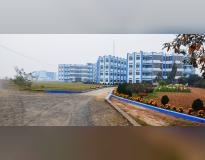We Teach Complex Thinking Skills, says Principal & Associate Professor of Abacus Institute of Engineering and Management
In a conversation with Shiksha.com, Dr Jinia Datta, Principal in Charge & Associate Professor of the EE Department at Abacus Institute of Engineering & Management talks about the career development programmes organised for each and every semester to boost up the placement record by the training and placement cell.
Dr Jinia Datta is currently working as Principal & Associate Professor of the EE Department at Abacus Institute of Engineering & Management. She has a vast teaching experience of over 14 years in different Engineering colleges in West Bengal. Dr Datta has published more than 10 international journal/conference papers in different reputed journals/conference proceedings.
Q1. What are the three things that your institute is doing that will enable it to differentiate itself from the competition?
- Prioritising students’ needs:
It is worth considering the growing impact of globalization. Not only has this brought about new academic subjects but institutions must accommodate for nontraditional students and an older student population. We try to prioritise student experience and academic offerings to fulfil a higher educational ‘brand promise ‘and in doing so we try to keep our curricula updated to reflect the changing marketplace and dynamics in higher education.
- Easily accessible laboratory, workshop or studio work:
An important pedagogical value of laboratory classes is that they enable students to move from the concrete (observing phenomena) to the abstract (understanding the principles or theories that are derived from the observation of phenomena). Labs, workshops and studios serve a number of important functions or goals, which include:
- to give students hands-on experience in choosing and using common scientific, engineering or trades equipment appropriately;
- to develop motor skills in using scientific, engineering or industrial tools or creative media;
- to give students an understanding of the advantages and limitations of laboratory experiments;
- to enable students to see science, engineering or trade work ‘in action’;
- to enable students to test hypotheses or to see how well concepts, theories, and procedures actually work when tested under laboratory conditions;
- to teach students how to design and/or conduct experiments;
- to enable students to design and create objects or equipment in different physical media.
- Problem-based learning
The earliest form of systematised problem-based learning (PBL) was developed in 1969 by Howard Barrows and colleagues in the School of Medicine at McMaster University in Canada, from where it has spread to many other universities, colleges and schools. This approach is increasingly used in subject domains where the knowledge base is rapidly expanding and where it is impossible for students to master all the knowledge in the domain within a limited period of study. Working in groups, students identify what they already know, what they need to know, and how and where to access new information that may lead to the resolution of the problem. The role of the instructor (usually called a tutor in classic PBL) is critical in facilitating and guiding the learning process.
Q.2. What are the top three initiatives undertaken by you that are helping your students become more industry ready?
Career Guidance Programmes
It is organised for all the students starting from the first year. The cell arranges training programmes like Mock Interviews, Group Discussions, Communication Skills Workshop etc and it also organizes Public Sector Exam Training (majorly Aptitude training classes) for students who are interested to join Government Sectors. It also invites HR Managers, trainers, and training associates from different industries to conduct training programmes not only for final-year students but also for the other three batches to help them with pre-grooming sessions from their very first year.
Teach Complex Thinking Skills
In the workplace, it’s not just about getting to the right end, but getting there by the best path. This is something that is reinforced in our institution by giving students context for decision-making and solving problems. Jobs in the modern workplace require innovation, creativity, and the ability to look at a task and not only see the outcome but also imagine different ways to achieve it. This is why internship is a mandatory area for students to understand application-oriented learning in a real-life work environment.
Collaboration Across Networks and Leading by Influence
The ability to lead others can definitely help a person to advance and become successful in their chosen career. Also, finding a job where one doesn’t need to be able to work closely and harmoniously with others can be quite a difficult task. To best prepare students in this area, more than just the typical teamwork is required. There are many different roles that students can fill during a project with their peers that allows them to work with others in a more collaborative way than just breaking apart a project and then putting it back together in the end.
Q3. What are the key attributes that a student should have in order to
- Qualify for your institution
- Fulfil regulatory requirements as stipulated by AICTE
- An ability to work effectively as a member and leader in teams, preferably in a multi-disciplinary setting.
- An ability to apply professional ethics, accountability, and equity.
- An ability to identify and to address their own educational needs in a changing world in ways sufficient to maintain their competence and to allow them to contribute to the advancement of knowledge
- An ability to communicate complex engineering concepts within the profession and with society at large.
- b. Get top grades in your institution
The student needs to be hardworking and must have good problem-solving skills. He must have an in-depth understanding of applications of the concepts.
Q4. Which programme/s would you say is/are your best? What is it that helps your institution differentiate itself for this programme?
The Career Development Programs organized for each and every semester to boost up the placement record more and more, by Training and Placement Cell, mainly follows the following:
- Personality Development Program
- Communication Skills Program
- Group Discussion Practice
- Mock Interview Sessions
- In plant Training
- Conducting Industry to Institute Convergence expert interaction sessions
- Public Sector Competitive Exams Training
- Industry Internship Programs
- Language Training Programme (mainly C, C++, JAVA, PYTHON, ETC.)
Q5. What are you doing to improve/drive better campus placements for your current students and alumni? What kind of jobs routinely come to campus? What would you say are the key recruitment trends for your university/college (observed over the past five years at your institute)?
As the logo says, our college is a joint venture of two reputed organization of West Bengal, JIS Group & Techno India. With the collaboration of both, the placement is always at its peak in each and every year. But the coronavirus pandemic that has swept the globe, is perhaps going to be recorded in history as the most impactful and consequential event of this century. It has stretched the capacities of governance, public health infrastructure and social administration of affected nations to their limits. At the same time, the lockdown enforced to prevent the spread has brought economies to the ground and jeopardised the job prospects of many.
But nevertheless, even in this crucial time, Placement Cell is playing a crucial role in locating job opportunities for Under Graduates passing out from the college by keeping in touch with reputed firms and industrial establishments. The Placement Cell constantly operates round the year to facilitate contacts between companies and graduates. The number of students placed through the campus interviews is continuously rising. On invitation, many reputed industries who visit here include our students to conduct interviews.
We have been successful in maintaining our high placement statistics over the years and the fact that our students bear the recession blues with record breaking placements itself is a testimony to our quality. Our ingenious alumnae have set new standards in the corporate world through their estimable contributions and it is my firm conviction that we will continue that legacy in the years to come.

News & Updates
Contact Details
Address
Abacus Institute of Engineering and Management, Natungram, Mogra
Hooghly ( West Bengal)
Get details of Similar Colleges
Student Forum
Answered 4 months ago
The WBJEE JELET cut-off at Abacus Institute of engineering and Management (AIEM) is different according to engineering branch and category. In JELET 2024, lateral entry B.Tech (Lateral entry lateral entry into the 2nd year of ) B.Tech programme closing ranks performed in the General All India catego
A
Contributor-Level 9
Answered 4 months ago
For B.Tech, you have to fullfill two criteria, firstly you need to score 45% or more in 12th boards and secondly you need to qualify atleast one of entrance exam JEE Mains or WBJEE. If you fullfilled this you are eligible to admission at AIEM. Also there are exams for lateral entry as well.
S
Beginner-Level 5
Answered 4 months ago
UG: you need to have atleast 45 percent in board and qualified any one from JEE Mains or wbjee.then visit the official site of abacus institute and apply online and pay the application fees and upload some required documents.Based on your entrance exam scores and application you may be called for co
S
Beginner-Level 5
Answered 4 months ago
No, it is not possible to get direct admission to Abacus Institute of Engineering and Management's B.E./B.Tech course based solely on WBJEE JELET. While WBJEE and JEE Main scores are considered for regular admissions, and lateral entry is possible with a Diploma and potentially a valid JELET score,
S
Beginner-Level 5
Answered 4 months ago
The highest package offered on campus is INR 8 LPA CTC (reported as 2023 & 24 placement data) whereas the average package is INR 2.4 lacs to 6.5 lacs depending on year. For computer Science, 82% students got placed. 20% of students are placed in startup companies.
S
Beginner-Level 5
Answered 4 months ago
Yes, Abacus Institute of Engineering and Management does offer scholarships, including tuition fee waivers of up to 100% for eligible students. These scholarships are awarded based on academic merit and extracurricular achievements. Specifically, students with a JEE Main rank below 1000 may be eligi
S
Beginner-Level 5
Answered 4 months ago
The hostel fees at AIEM is INR 23000 per year for both male and female students. The hostel offers double sharing room, triple sharing room for students with basic facilities like bed, table, chair and most necessary one is wifi, although wifi speed is not that great but it works. Additional facilit
S
Beginner-Level 5
Answered 4 months ago
For BE/B.Tech courses they charge INR 2L-3.6L depending on branch.10 courses are offered. The duration is of 4 years. For UG Diploma courses they charged INR 58,000 per year .Similarly, for after 10th Diploma, they charge INR 54,000 per year for 5 courses which are available.
S
Beginner-Level 5








AIEM Landran concluded the placement drive for its BTech batch passed out in 2023. As per the latest report, the the highest and average package offered to BTech CSE students during the Abacus Institute of Engineering and Management placements 2023 stood at INR 12 LPA and INR 6.50 LPA, respectively. The top recruiters of Abacus Institute of Engineering and Management in 2023 included TCS, Virtusa, IBM, DTDC, Royal Research, L&T Infotech, Royal Enfield, etc..